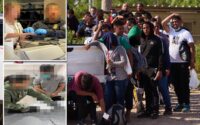‘Woke’ policies in Austin causing homeless to overtake parks
Top family destinations in Austin, Texas, have become magnets for the homeless — and the city’s woke policies are preventing cops from doing anything about the illegal scourge, critics say.
People living out of vehicles stuffed with luggage, chairs and other items have been increasingly lining the streets near popular spots such as Zilker Metropolitan Park and Barton Springs Pool, thanks at least in part to the area’s skyrocketing housing prices.
But while local laws do not allow people to live out of parked cars around public green spaces, there aren’t enough police officers to combat the quality-of-life issue — because the liberal city policies have caused cops to flee the department, critics say.
Sick and tired cops are continuing to retire in droves, adding to 264 existing vacancies, according to the Austin Police Association.



The police department is so short-staffed that it disbanded its park patrol months ago — and even 911 calls are now being redirected to the city’s 311 non-emergency number because there aren’t enough officers to respond.
“If you come home and find your home burglarized, calls like that are now going to 311,” police union President Thomas Villarreal told The Post on Tuesday. “You’re not getting a police response to many property crimes if it’s not a violent crime that is currently ongoing.”
That’s left park-goers to fend for themselves.
“It would be nice to see a policeman here,” a woman whose car was broken into told KXAN.
Mark Hilbelink, executive director of Sunrise Homeless Navigation Center, told the outlet, “We are on pace to assess about 1,000 children living in cars this year, and there are a lot of families living outside.”



That number climbed from 400 last year, he said.
Asked if the situation were a crisis, “I would absolutely say so,” he told the local station.
In the last few years, Austin mortgages and rents have sky-rocketed, as the Texas capital has become a sought-after destination for New Yorkers, Californians and other non-Texans who drove up real estate prices.
“I would say for a lot of people, there is a progression of having your own place, then maybe living with family or someone that you know,” Hilbelink explained of the downhill slide. “Then oftentimes, living in a car, and then eventually just living completely unsheltered.”


